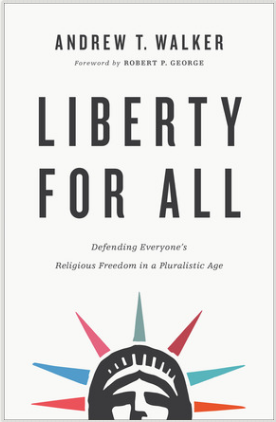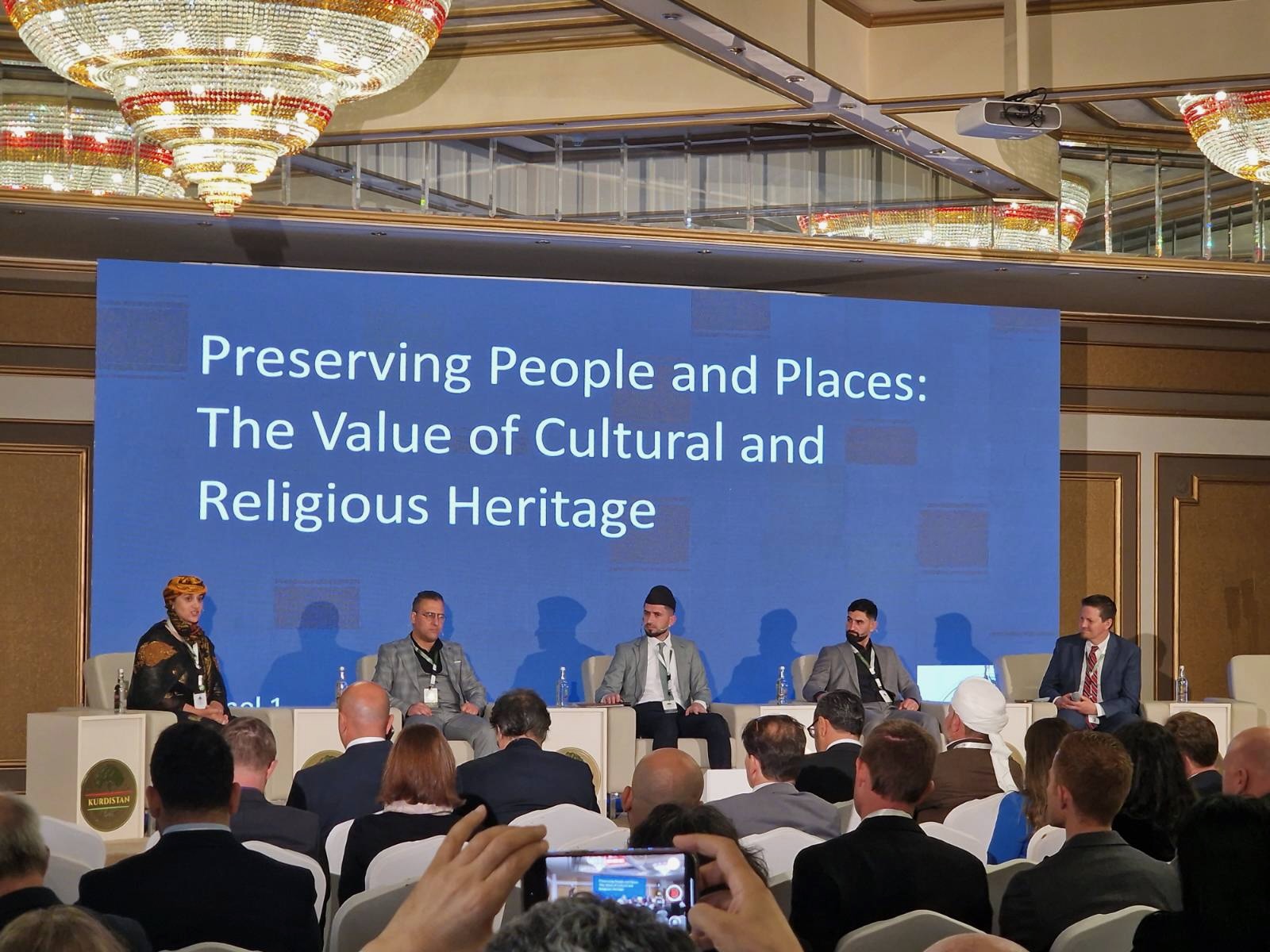Andrew T. Walker, Liberty for All: Defending Everyone’s Religious Freedom in a Pluralistic Age (Grand Rapids: Brazos Press, 2021)

Relativism is the end of religious freedom. And because relativism is at the center of the cultural imaginary of the West, pervading the ideological air we breathe, religious freedom is under increasing threat even in the Western democracies of Europe and North America. This is so even though the Western democracies officially — and in most cases sincerely — claim to respect religious freedom and guarantee it. In the postmodern West, even the religious freedom movement itself is sometimes affected by relativism’s noxious fumes. For those reasons and more, Andrew T. Walker’s new book, Liberty for All: Defending Everyone’s Religious Freedom in a Pluralistic Age, is exactly what we need today. It presents a compelling case for religious liberty from an orthodox Christian perspective, a point of view that unequivocally rejects relativism.
Walker, an associate professor at The Southern Baptist Theological Seminary and executive director of the Carl F. H. Henry Institute for Evangelical Engagement, grounds his case for religious freedom in his firm belief that Christianity is the only true religion. He states that religious freedom for all is rooted first and foremost in the Lordship of Jesus Christ. Significantly, it is not each individual who is Lord over her own conscience, but Jesus Christ who is Lord over the conscience. The clear implication of that is that freedom of religion is not based on the idea of an inherent right to follow one’s conscience:
Because Jesus Christ is Lord over the conscience, no human institution or individual can legitimately usurp Jesus’ authority….He has the authority and the power to execute judgment over spheres that governments or rulers do not have sanction over.
Jesus Christ has the right to judge those who choose a religion according to their conscience. Importantly, however, Jesus Christ is the only one who has the ultimate right to pass judgment on such things. Governments and human beings do not have that right: “It is precisely because Jesus is the ultimate judge that humans and human institutions cannot judge erring consciences over religious matters.” Thus, the right to follow one’s conscience, thought not an inherent right, is a fundamental civil right: one absolutely necessary to the common good, to social peace, to mutual respect and true toleration among people.
Secondly, Walker grounds his case for religious freedom in the nature of the human person as made in the image of God. This entails moral agency — and thus moral responsibility — which entails freedom of religion:
God gave human beings, as his image-bearers, moral agency…He designed humans to order their lives according to the truths they come to grasp. Moral agency includes the many “dimensions of one’s personhood — reason, conscience, will, emotions, body, and soul.” …If human beings are anything less than free to reach their own religious conclusions by way of reason and conscience, they lack the moral agency central to authentic living.”
Throughout, Walker’s biblical case for religious freedom rejects any postmodern “celebration” of religious diversity. Any form of Christianity that affirms the faith’s basic truths cannot celebrate when someone chooses to believe a religion other than Christianity. The one true God, and He alone, deserves to be honored and glorified by every human being.
But God’s followers are not to be his enforcers. They are to be his ambassadors. They are to witness to the truth in humility and full respect for the image-bearing moral agency of every person, including those who do not honor the one true God. Christianity is about the law of love: Love God above all and your neighbor as yourself. Again, for Christians, the prohibition against forcing the truth on others arises out of the Lordship of Jesus Christ and his example as the One who, though God the Father had made him Lord of Lords and placed everything under his authority, became a servant, humbling himself and suffering and dying in our place, even when we were still his enemies:
Since Christ alone, crucified-for-sinners, has the final right to [judge] his religious enemies, therefore Christianity will spread not by [Christians’ judging] for Christ, but by dying with Christ — that others might live. The final triumph of the crucified Christ is a call to patient suffering, not political success….A commitment to religious liberty leads to a patient trust in Christ’s authority and a posture of humility toward religious diversity, knowing that… coercion [cannot]…bring about belief.
But how is relativism behind the threats to religious freedom in the West? As should have been foreseen, relativism has developed its own rigid, absolutist dogma — one that, in the name of a false tolerance, brooks no opposition. A central tenet of that dogma is that sexual minorities, LGBTQ and gender-fluid individuals (and to a lesser extent women), are oppressed minorities. Thus, the traditional views on sexuality and marriage of most religions, including Christianity, Judaism, and Islam, deny these oppressed groups their human rights. In refusing to embrace gay marriage, gender fluidity, and other sexual innovations as positive goods, they violate the dignity of these oppressed minorities. Thus, traditional religious faith amounts to nothing more than bigotry and hatred. It must be suppressed.
In its emphasis on the “universality and interdependence” of all human rights, the European Union (EU) has already tipped its relativistic hand, opening the door to a severe downgrading of religious freedom when measured against the promotion of the postmodernist rights that are so much more important in today’s West. The EU guidelines on religious freedom are particularly revealing. They state: “In promoting and protecting freedom of religion or belief, the EU is guided by the universality, indivisibility, inter-relatedness and interdependence of all human rights, whether civil, political, economic, social or cultural.”
What is the next step in this argument? Later in the EU Guidelines we read the following:
Certain practices associated with the manifestation of a religion or belief… may constitute violations of international human rights standards [and] The right to freedom of religion or belief is sometimes invoked to justify such violations. The EU firmly opposes such justification…. Violations often affect women, members of religious minorities, as well as persons on the basis of their sexual orientation or gender identity.
In 2013, the year in which the EU’s religious freedom guidelines appeared, the EU also published its guidelines on LGBTI rights. Taking the above argument to its logical conclusion, the EU LGBTI guidelines state that “the EU is committed to the principle of the unive
rsality of human rights and reaffirms that cultural, traditional or religious values cannot be invoked to justify any form of discrimination, including discrimination against LGBTI persons.”
What does “any form of discrimination” mean? As several people have found out — including Swedish pastor Ake Green, who was prosecuted for hate speech after preaching a sermon on the biblical view of homosexuality, and Finnish pastor, Juhana Pohjola, and Finnish member of parliament, Päivi Räsänen, who are charged with three counts of hate speech for sharing their biblical beliefs about marriage — our postmodern elites believe that defense of traditional marriage or sexual morality, as taught in Christianity and other faiths, are prime examples of discrimination and hate speech. Pastor Green spent a short time in prison, but was then released. If convicted, Pohjola and Räsänen could face up to two years in prison. In today’s West, in Europe, the United States, and Canada, there are many other examples of people being sanctioned for expressing their traditional religious faith.
As the West becomes ever more godless, the dogma of relativism is developing, hardening, and gaining in popularity to the point at which politicians, even in the more religious United States, believe an anti-religious freedom stance will gain them votes among undecided swing voters in the political center. In 2019 Beto O’Rourke, a contender for the Democratic presidential nomination from the conservative state of Texas, said churches and religious institutions that oppose same-sex marriage should lose their tax-exempt status, which at the very least would severely restrict their ability to operate as they currently do. Ominously he explained, “we are going to stop those who are infringing upon the human rights of our fellow Americans.” During the confirmation hearing of Amy Coney Barrett in 2017, now a Supreme Court Justice but at the time a nominee for U.S. Circuit Court Judge, several senators expressed concern about having her as a Circuit Judge because she was a believing Catholic. They feared, in particular, that her faith might influence her rulings on abortion and same-sex marriage. Senator Dianne Feinstein put it most bluntly when she said, “Your dogma lives loudly within you.”
Before our very eyes, we are witnessing how the relativistic celebration of diversity is turning more and more clearly against religious freedom in the West. And it must be so. Celebrating diversity for diversity’s sake, regardless of the nature and content of the diverse beliefs we are supposedly celebrating, is sometimes done even by advocates for religious freedom. But this is a mistake. Celebrating diversity for its own sake cannot but lead to intolerance to all who oppose “diversity” as defined by the relativists. If liberty is founded upon relativism, then everything — such as orthodox Christianity, Judaism, and Islam — that is based on a belief in objective truth and in non-negotiable obligations that arise out of that truth is utterly anti-liberty and justly to be suppressed.
And it gets worse than that: If diversity is all that counts, and if it is an active good to believe that truth is something that can be freely chosen, then only raw power remains. Those who are weak and powerless will not be able to exercise their so-called right to choose; they will be shunted aside at the whim of the powerful. Pope John Paul II called it what it is: the culture of death. The pretended tolerance of relativism must inexorably, unavoidably, translate in practice into what it really is: the most implacable, ferocious intolerance.
So, if we who believe and fight for religious freedom do not celebrate religious diversity, what do we celebrate? Here I will venture only to speak for Christians. Christians revere God’s wisdom in creating all human beings in his image, and in giving them moral agency. That means that Christians are called to celebrate all of our fellow human beings; to love others and honor them as God’s image-bearers, equal in dignity to ourselves, regardless of their religious beliefs or lack of such. And we can cooperate with our Jewish, Muslim, and atheist friends to fight, shoulder to shoulder, for everyone’s freedom of religion. This is what Walker accomplishes in his celebratory and rigorously Christian case for religious liberty.
Todd Huizinga is Senior Fellow for Europe at the Religious Freedom Institute and a member of the advisory board of the Center for Security Policy. He is the author of The New Totalitarian Temptation: Global Governance and the Crisis of Democracy in Europe and Was Europa von Trump lernen kann.
This is a version of an essay that was written for The European Conservative.
THE RFI BLOG

RFI Leads Training Session on Religious Freedom Law and Policy for U.S. Army War College

Oral Argument in Charter School Case Highlights Unconstitutional Motives Behind OK Attorney General’s Establishment Clause Claim

Largest Longitudinal Study of Human Flourishing Ever Shows Religion’s Importance

Keys To Human Flourishing: Faith And Relationships Outweigh Wealth

RFI Champions Religious Freedom at Kurdistan’s First National Prayer Breakfast
CORNERSTONE FORUM

Reaffirming Religious Freedom: Bridging U.S. Advocacy and Iraq’s Constitutional Framework

Political Polarization, Same-Sex Marriage and Religious Liberty

Bridging the Gap Between International Efforts and Local Realities: Advancing Religious Freedom in the MENA Region

Challenges to Religious Freedom in Iraq and the Critical Need for Action

